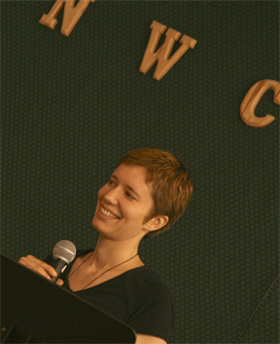by Lora Steiner
I’m learning what it means to be Mennonite.
When I was a child, my teachers in this study came from the farm lands around Kidron, Ohio, where I was raised. They taught in my school, led discussions at church, organized the Mennonite Central Committee Relief Sale, pieced quilts and sang solid harmonies. These days, my teachers don’t generally look like me, aren’t related to me and often haven’t heard of shoofly pie. Some of them even have tattoos. But all of them—from the conservative Mennonite women who sell me Swiss cheese to my Colombian pastor friends—are reminding me about what it means to follow the risen Christ.
 I was reminded of this richness of the Anabaptist tapestry a few weeks ago when I went to visit Nations Worship Center in south Philadelphia. Nations Worship is an Indonesian-speaking congregation that recently joined Franconia Conference. I had been sent there to write about them in preparation for this move toward membership. At first glance, it seemed as though we had little in common: different ethnicities, different languages and different cultures. The church has a praise band and sings choruses in Bahasa Indonesia. Hands clapped and bodies swayed with the music. Scripture was read aloud together (as is the practice each Sunday). Members are invited to give testimony about God’s movement in their lives. The sermon reflected the realities of being a foreign people in a new land. A meal was served after the service; rice and tofu and a beef soup.
I was reminded of this richness of the Anabaptist tapestry a few weeks ago when I went to visit Nations Worship Center in south Philadelphia. Nations Worship is an Indonesian-speaking congregation that recently joined Franconia Conference. I had been sent there to write about them in preparation for this move toward membership. At first glance, it seemed as though we had little in common: different ethnicities, different languages and different cultures. The church has a praise band and sings choruses in Bahasa Indonesia. Hands clapped and bodies swayed with the music. Scripture was read aloud together (as is the practice each Sunday). Members are invited to give testimony about God’s movement in their lives. The sermon reflected the realities of being a foreign people in a new land. A meal was served after the service; rice and tofu and a beef soup.
I don’t speak Bahasa Indonesia and my digestive system tolerates neither gluten nor soy, so I couldn’t take communion or partake in the fellowship meal. I’m used to a pretty staid church service, one that generally doesn’t involve raising my hands in the air or anything remotely resembling dancing. Even though I joke that attending a United Methodist seminary in northern New Jersey is a form of exile, I certainly can’t relate to the challenges of being a recent immigrant. But what I found that Sunday morning was a warm grace and hospitality extended from one part of the body of Christ to another. The pastors spoke passionately about a commitment to community, stewardship, simplicity and justice as an expression of their faith. I learned how the church is trying to reach out to the the broader Indonesian community in Philly by (among other things) offering translation services.
When it came time for me to give my testimony, I stood in front of the congregation and told them that even though I could not understand much of what was said, I could feel the Spirit in that place. I waved my hands with everyone else. I declined the bread, but drank the grape juice. While everyone else prayed with words I couldn’t understand, I gave thanks for a theological language we hold in common.
It was the Jewish theologian Abraham Joshua Heschel who once said, “To be or not to be is not the question. The question is how to be or how not to be.” And that is something which cannot be learned alone; we must strive for it together.
The opinions expressed in articles posted on Mosaic’s website are those of the author and may not reflect the official policy of Mosaic Conference. Mosaic is a large conference, crossing ethnicities, geographies, generations, theologies, and politics. Each person can only speak for themselves; no one can represent “the conference.” May God give us the grace to hear what the Spirit is speaking to us through people with whom we disagree and the humility and courage to love one another even when those disagreements can’t be bridged.
